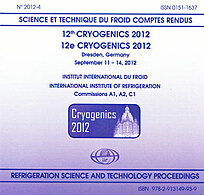
IIR document
The AEGIS low temperature system.
Number: pap. n. 073
Author(s) : EISEL T., BREMER J., BURGHART G., et al.
Summary
The antimatter experiment AEGIS is being constructed at CERN. Its scientific goal is to measure the gravitational interaction between antimatter and ordinary matter. Therefore neutral antihydrogen is subjected to the earth’s gravitational field. In order to perform precise measurements, the antihydrogen needs to be produced at very low temperatures. This is achieved by cooling the combining antiprotons to temperatures of about 100 mK. The antiprotons are trapped and cooled in a Penning trap. The required electrical fields are generated by a series of electrodes, which are charged independently with peak voltages of up to 1 kV. The electrodes are formed by thin gold layers sputtered onto polished sapphire. Sapphire provides reliable electrical insulation and very high thermal conductivity. The bottom of the sapphire is gold sputtered too and is pressed against the mixing chamber of a dilution refrigerator. An indium foil sandwiched between the sapphire and the mixing chamber is used to reduce the thermal boundary resistance.
Available documents
Format PDF
Pages: 102-105
Available
Public price
20 €
Member price*
Free
* Best rate depending on membership category (see the detailed benefits of individual and corporate memberships).
Details
- Original title: The AEGIS low temperature system.
- Record ID : 30005803
- Languages: English
- Source: Cryogenics 2012. Proceedings of the 12th IIR International Conference: Dresden, Germany, September 11-14, 2012.
- Publication date: 2012/09/11
Links
See other articles from the proceedings (78)
See the conference proceedings
Indexing
- Themes: Large-scale cryogenic applications
- Keywords: Thermal conductivity; Sapphire; Cryotemperature; Dilution; Cryocooler; Cryogenics
-
High-power Stirling-type pulse tube cryocooler ...
- Author(s) : SUN J., DIETRICH M., THUMMES G.
- Date : 2012/09/11
- Languages : English
- Source: Cryogenics 2012. Proceedings of the 12th IIR International Conference: Dresden, Germany, September 11-14, 2012.
- Formats : PDF
View record
-
The MITICA facility: a possible optimization of...
- Author(s) : FELLIN F., PASSARDI G., VALENTE M., et al.
- Date : 2012/09/11
- Languages : English
- Source: Cryogenics 2012. Proceedings of the 12th IIR International Conference: Dresden, Germany, September 11-14, 2012.
- Formats : PDF
View record
-
Design proposal for MITICA cryogenic plant.
- Author(s) : VALENTE M., FELLIN F., HAAS H., et al.
- Date : 2012/09/11
- Languages : English
- Source: Cryogenics 2012. Proceedings of the 12th IIR International Conference: Dresden, Germany, September 11-14, 2012.
- Formats : PDF
View record
-
Cryogenics for the European Spallation Source.
- Author(s) : WANG X. L., KOETTIG T., GALLIMORE S., et al.
- Date : 2012/09/11
- Languages : English
- Source: Cryogenics 2012. Proceedings of the 12th IIR International Conference: Dresden, Germany, September 11-14, 2012.
- Formats : PDF
View record
-
Performance analysis of EAST cryogenic control ...
- Author(s) : ZHOU Z. W., ZHANG Q. Y., ZHUANG M., et al.
- Date : 2014/04/07
- Languages : English
- Source: Cryogenics 2014. Proceedings of the 13th IIR International Conference: Prague, Czech Republic, April 7-11, 2014.
- Formats : PDF
View record
